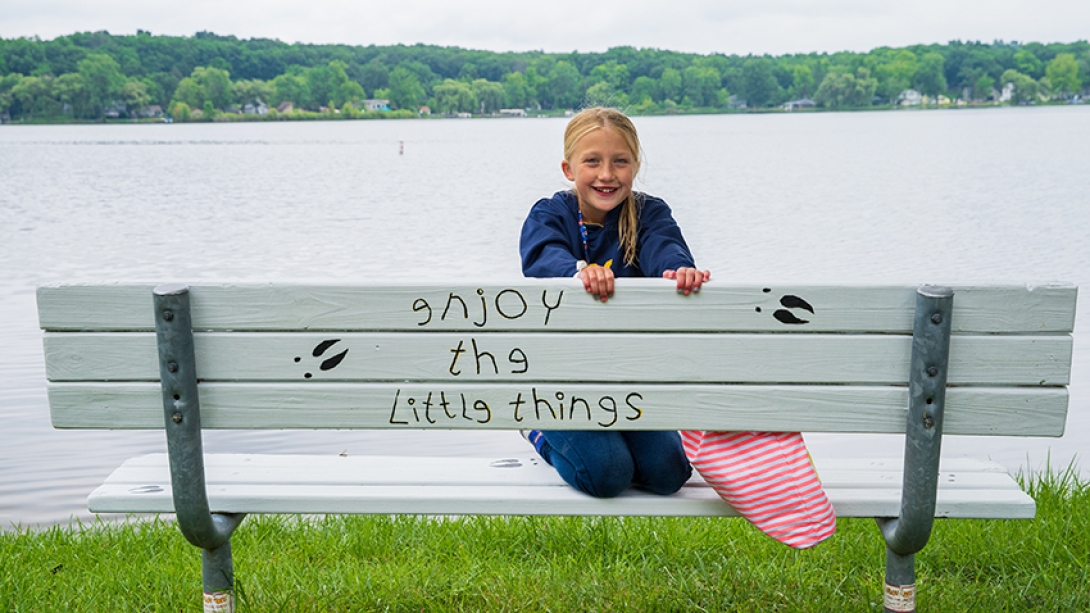As the anniversary of receiving her new heart draws near, a brave 9-year-old continues to enjoy her life like a typical kid.
7:00 AM
Author |
Flipping through stacks of colorful scrapbooks in her bedroom, Madeline George points out favorite memories that include birthdays, family trips and quality time with her three younger sisters.
LISTEN UP: Add the new Michigan Medicine News Break to your Alexa-enabled device, or subscribe to our daily audio updates on iTunes, Google Play and Stitcher.
In one picture, Madeline dons a pink crown. The photo was taken on her first birthday, which she spent in the hospital. Two days later, she received a life-changing birthday gift: a new heart.
For her parents, Andy and Kara George, that day is the reason those scrapbooks are full.
"Since her heart transplant, every day is a new day for her," Kara George says. "She's been able to grow up and go to school, play with her sisters, enjoy regular kid things like riding a bike and swimming and going to summer camp."
Those milestones, she knows, are only possible because of another family's loss.
"We wake up every day thankful and feeling so blessed," Kara adds. "Someone, in their most devastating moment, chose organ donation — and because of that, my child had a second chance at life. It's so powerful. I can't even put that into words for you.
"Without that selfless decision, Maddie wouldn't be here today."
Life-changing diagnosis
A former cardiac nurse, Kara knew something was wrong when then-6-month-old Madeline lost interest in food and started vomiting after a bottle.
Then, symptoms became even more worrisome, with episodes of having to arouse baby Madeleine from sleep because her pulse was too fast.
MORE FROM MICHIGAN: Subscribe to our weekly newsletter
After several emergency room visits and tests, the family's fears were confirmed.
"I remember hearing that the attending cardiologist was coming to see us at 2 a.m. and just feeling dread. My heart sank," she says. "I knew something was very, very wrong."
Madeline was transferred to C.S. Mott Children's Hospital at the University of Michigan under the care of pediatric cardiologist Kurt Schumacher, M.D.
She was diagnosed with restrictive cardiomyopathy — the rarest form of cardiomyopathy, a condition that prevents the heart from pumping blood properly and leads to heart failure.
The only cure was a heart transplant.
There was no guarantee a suitable donor would be immediately available. Although the number of pediatric organ donors exceeds recipients, many minors still wait longer than adults.
"The average wait for a new heart is about six months," Kara says. "But without a new heart, six months was maybe all she had to live. I just remember sitting in a rocking chair, holding her, just sobbing.
"As a parent, it's the most helpless, devastating feeling, knowing your child is so sick she could die. You're just hoping she will make it to the next minute, to the next hour, to the next day.
"We didn't know what the future held for her."

A new heart for Madeleine
While waiting for a heart, Madeline nearly died several times. After one seizure, Kara had to do CPR to keep Madeline breathing until she could be airlifted back to Mott.
Madeline spent nearly two months in the pediatric cardiothoracic intensive care unit at Mott on medications that helped keep her little heart from failing.
A day after her first birthday, the family was able to take her to their home in Pewamo, Michigan, for a temporary hospital respite.
SEE ALSO: Strength in Numbers: Why Organ Donation Matters [Infographic]
Fifteen minutes into their drive, they got a phone call from the hospital.
"I was thinking, 'What did we forget?'" Kara says. "They said, 'You need to come back. We have a heart for Madeline.' It still gives me goosebumps. I can't even describe the feeling."
Her surgery, led by Mott pediatric heart surgeon Richard Ohye, M.D., was a success, and the recovery was as smooth as could be expected.
Nine days later, she could finally go home — to stay.
Plenty to celebrate
Today, Madeline, who just started fourth grade, loves baking, crafting and playing outside.
This summer, she took a trip to California to meet her new cousin and experienced her first overnight camp at Camp Michitanki. The camp, created by the U-M Transplant Center, is designed for kids who have had an organ donation; Madeline spent the week swimming, canoeing, fishing and making new friends.
SEE ALSO: The Faces of Transplant: How Organ Donation Saved Their Lives
This October, Madeleine turns 10 — a milestone that also marks her nine-year heart transplant anniversary.

"It's amazing to think back to that time in the hospital when she was a baby and to see her thriving today. You would never guess she had a heart transplant," says Kara, who recently started a job at Gift of Life Michigan as an organ donation coordinator.
"Just watching her experience life every day is a reminder of how thankful we are for the gift that she was given. I just look at her and think, 'You're here today.'"
The celebration is dampened only by the Georges knowing that Madeline will probably need a new heart someday.
"We live every day wondering, is this heart going to fail? When is it going to fail? What things are in store for her future?" Kara says. "There have been so many research advances since she had her transplant, and I can only hope it continues to advance."
"I think it's important to use her story and voice to show people the impact of organ donation and research," Kara adds. "We are just so thankful to watch Maddie grow up and experience life.
"I always tell her, if this inspires one person, we've done our job."
Photos by Kara George and Bryan McCullough

Explore a variety of health care news & stories by visiting the Health Lab home page for more articles.

Department of Communication at Michigan Medicine
Want top health & research news weekly? Sign up for Health Lab’s newsletters today!





